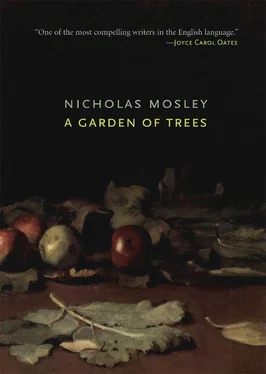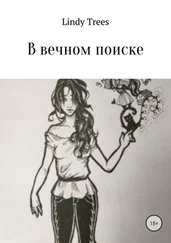It was a windy day. I had slept badly on a sofa in the flat, and my eyes were heavy as if drained of moisture. Marius came early, before the others were up, and when he asked me I did not think of what to expect. I dressed, and had breakfast, and followed him. We went in a taxi, I did not know where.
The day seemed blown with the litter of ages. Driving through the wind it was as if we were leaving our past behind like paper. Out beyond the railings, across the waiting world, I felt little except the numbness. And yet there, at the end, was the centre of the mystery. Marius’s wife had always seemed to me the guardian of our secrets. Stepping out of the taxi and standing on the threshold I might have been some novice on this edge of another life.
A mottled, unpretentious building, one of a row, more of a nursing home than a hospital, with large knobs of bells on either side of the door. We waited. Inside there was an atmosphere of caution combined with disregard. Silent, neat officials lurked behind half-closed doors, watching yet oblivious, not caring to hide and yet not willing to help. Marius led the way, ignoring them, steadily, like a soldier marching through an occupied town. I followed him up the carpeted stairs and along the vanishing rubber-tiled corridors. There was a silence like that which precedes an action. Then he stopped and knocked on a door. Again we waited.
This was a private nursing home, I could see; quiet, rich, discreet; suffering muffled behind doors of polished wood, the privacy of richness observed as in a bank. At the far end of the passage nurses glided, carrying objects shrouded under heavy white cloths. Disease, dying, was well camouflaged here, white-painted with cleanliness, scrubbed with optimism — the buoyant, determined optimism of a healthy pretence. As we waited a figure emerged upon the passage like a ghost, a disheveled old man in a dressing-gown, lost, flat-slippered, poling his old thin neck out of his garment like a tortoise, peering and bewildered. A nurse saw him, and seized him, and steered him flip-flap down the passage to the bathroom. He seemed dingy and crumbling in the stiffness of the building, as if he had strayed from the housemaid’s cupboard where the dustpans and brushes are kept. The patients often seem out of place in a nursing home. Marius became uneasy waiting outside the door, so he pushed and went in.
A white, bright room, with flowers. A lot of painted steel, painted girders, like the cabin of a ship. A high bed, hard yet somehow crooked, and a whiteness, a terrible whiteness, like snow.
And the woman in the bed was part of it. She was hard, stiff, quite motionless, white skin against the white pillows; silent, and lined, and erect; nothing of the old man’s decay, crumbling; no shuffling, flip-flap shuffling, no age, softness; just hard and white and a creaking, somehow, with the tension of being alive. The being-alive creaking against the not-being.
Her hair was black, and her eyes were black; still no colour. Blackness was only the intensifying of whiteness, and whiteness remained. A young face, petrified; a terrible thinness stretched over bones like a sheet over iron spikes. Arms and shoulders covered, draped; just the neck fluted like a pillar and the fragile, staring, breakable china face. Such a beautiful face. And one hand curved up on the counterpane like a sun-dried, brittle, fossilized shell.
“I have brought a friend,” Marius said. “Do you want us?”
Her eyes moved, and her head slightly, and she whispered, “Yes.”
“Here is a chair,” Marius said. I sat on it. Marius leaned on a table by her bed.
“It is kind of you to come,” she said to me, whispering; the fragile, unblinking black eyes staring at me. Then her eyelids closed, for a moment, with an almost imperceptible movement, like the falling of a drop of water, and when she spoke again her voice was clear, defined, like the echoes of a flute. “You are a friend,” she said. “I have not seen you before.”
“No,” I said; “I am sorry.” I did not know what I was saying.
“Marius has brought you,” she said. “I do not see many people now.” She spoke liltingly, with great precision. She blinked again. Then her white, cockle-shell hand fluttered up towards Marius. “Marius,” she said; “why have you brought him?”
“Would you like to talk?” he said. “Shall I go?”
“Yes,” she said. “For a minute.”
And Marius went.
In the quietness I could hear the distant, cavernous sounds of the traffic of London. There was no sound from the building, no sound at all. Facing the white blinding stare of the woman amongst the pillows I felt that I was dead.
“Tell me,” she said, “when you first met Marius.”
I told her of our meeting, and after.
“And was he alone?” she said.
I told her of Annabelle.
“Tell me more about her,” she said.
I told her. And then I told her about Peter, and the flat, and what I knew of them.
“Thank you,” she said. She lay for a while, not heeding me. Then she moistened her lips, and I saw how incredibly strong her teeth were, a young woman’s teeth, like lilies. “Do you always tell the truth?” she said.
“No,” I said.
“Perhaps you do. I am sorry to ask you so many questions. There are just one or two things I wish to know, you see, that Marius cannot tell me. The truth anyway is not something that can be told.”
“No,” I said.
“I am dying,” she said. “Has Marius told you that?”
“No,” I said.
“Has he told you anything about me?”
“No,” I said.
“Perhaps that too is something that cannot be told. And what do you think of Marius?”
“I think. . ” I began. My voice sounded thick, artificial, like a buffoon. It rose upon the air like some inflated condescension. My throat would not obey my ears, and I could not bear it. “I think a great deal,” I said.
“Do you?” she said. She seemed to frown, as if in embarrassment. Her hand fluttered up towards her eyes. “I want to know that Marius will not be destroyed,” she said.
It did not seem that there was anything now that I could say. The room had become like a box in which bodies are preserved for centuries. Around us hung the dust in the shapes that life had given it, the eyes and hands and tongues that are moistened into movement, that are dried again in tombs until a breath can collapse and shatter them. In front of our throats stretched a tension of gossamer that only the note of a reed could pierce. When she spoke her voice was clear as a needle: it did not harm. But for me, I could not speak as men speak, with their faces, because the noise of impurity would have scattered the dust. But there was something that had to be said, and when I heard it it was not as if it had come from me, but rather from outside, from where men, in another age and another existence, seek to ravage the tomb with the clink of their axes. I said, “What was it that happened to you?”
“Has Marius ever talked to you about love?” she said.
“Yes,” I said.
“And did you agree with it?”
“I don’t know,” I said. And then again, as an echo, as the sound of a pick in the stillness where dead men have not heard a sound for centuries, I said, “What was it that happened to you?”
“Me?” she said. “Shall I tell you?”
I looked away from her. The sounds were clearer now. Sand began to fall between the corners of the girders, a trickle like an hour-glass when the earth is rocked. “Yes,” I said.
“I said that it was something that cannot be told. I shot myself. Is that what you want?”
“No,” I said.
“Marius came into the room and I hit him. Marius was a shadow. There is nothing to believe in when people are shadows. Is that what you have found?”
Читать дальше












